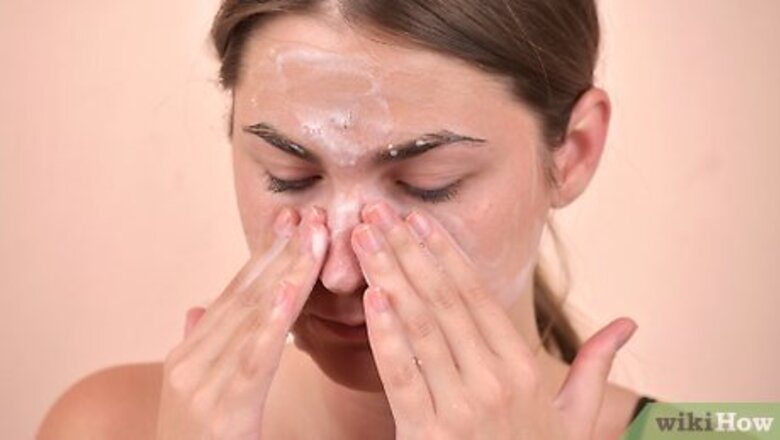
views
- Cleanse and moisturize your face before applying powder foundation for the best texture.
- You can improve the longevity and coverage of the foundation by applying primer and concealer beforehand.
- Make sure that your powder foundation matches the tone of your skin to avoid drawing attention to it.
- Use a large brush to apply the foundation to your face, and blend it into your neck for the cleanest application.
Preparing Your Skin
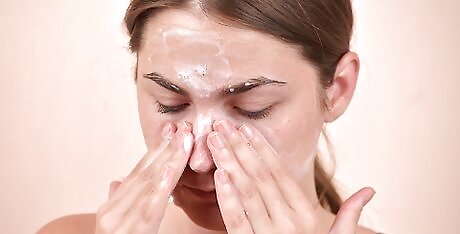
Wash your face with a mild cleanser. Head to the sink and get your skin wet, then rub a mild face cleanser all over your face. Rinse it off with cool water, then pat your face dry with a towel before you start applying your makeup. Having clean skin is really important when you're working with powder foundation. If there is any dirt or oil on your face, the powder will sit on top of it and draw attention to it. If you have any flaky skin, use an exfoliating wash to scrub the dead skin off before you start applying your foundation.
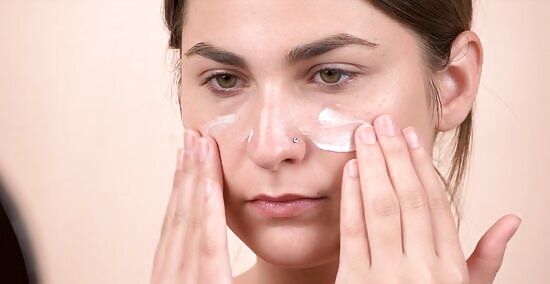
Apply a facial moisturizer to your skin. Squeeze out a pea-sized amount of moisturizer and rub it into your skin, focusing on any areas that look dry or flaky. Let the moisturizer soak in for a few minutes before you start putting on foundation. Try to look for a moisturizer formulated for your skin type (dry, oily, or combination). You should also make sure you’re using a face lotion, not a body lotion, to avoid clogging your pores. Moisturizer is super important when working with powder foundation. If your skin is dry at all, there’s a chance that your foundation could clump up and look cakey.
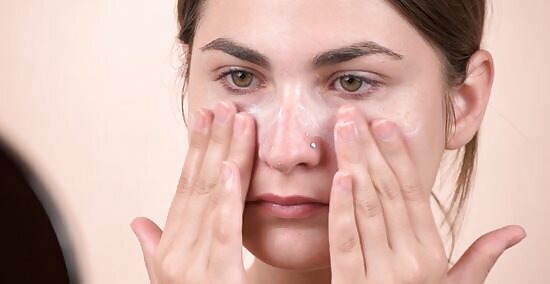
Add a primer to make your makeup last longer. Put a dime-sized amount of primer on your fingertips and rub it around. Gently rub the primer into your skin, focusing on the places that get the most oily throughout the day (like your nose, chin, and forehead). Let the primer soak in for 1 to 2 minutes before you move on. Primer is also an essential step before using powder foundation since it helps to smooth out your pores and create a flat, even surface for the makeup to sit on.
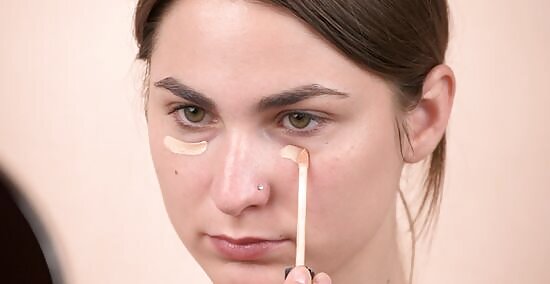
Dab concealer under your eyes and on blemishes for extra coverage. Grab your bottle of liquid concealer or a stick concealer and pat it underneath your eyes. Do the same thing for any blemishes you might have on your skin, then buff the concealer into your skin with a flat makeup brush. You can’t put liquid or stick concealer on top of powder foundation, which is why you have to do this step first. Concealer is totally optional, so you don’t have to use it if you don’t want to.
Using a Brush
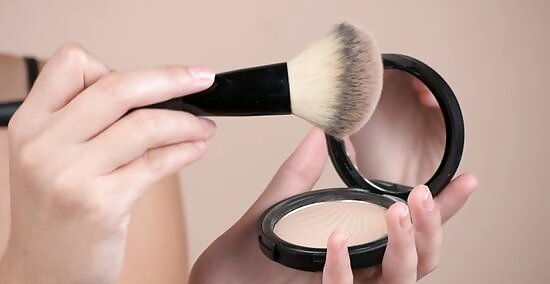
Press a large, dense brush into the powder foundation. Choose a brush that is fairly wide to get the most amount of coverage, and pick one that has dense bristles that are hard to the touch. Gently dip the brush into the powder foundation to pick up the product, and swirl it around slightly if you need to. You can use either a synthetic or a natural brush for your foundation. If the foundation is loose, pour some into the lid before dipping your brush in. If it’s more compact, leave it in the bottom of the container. A Kabuki brush works well for powder foundation. You can also use a blending sponge or a dense foundation brush if you need to.
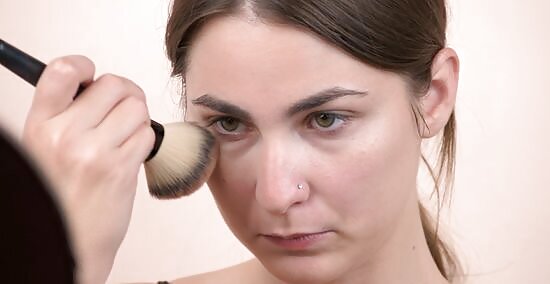
Pat the brush onto your T-zone and under eyes. To start applying the makeup, focus on the spots that collect the most oil throughout the day—your nose, chin, and underneath your eyes. Really press the brush into your face to pat the powder into your skin. Using this motion will help to set the concealer on your face while also giving you more coverage with the foundation. Patting the foundation into your skin is super important! If it’s not patted into your skin enough, it won’t settle into the crevices of your face and it has a higher chance of melting off throughout the day.
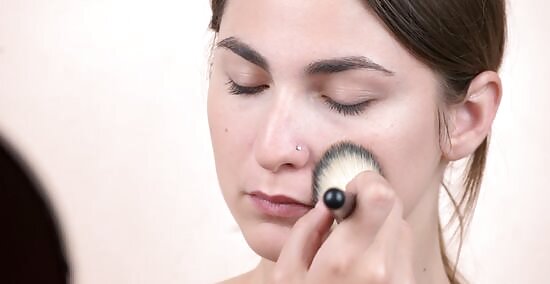
Swirl the brush onto your cheeks and forehead. For the rest of your face, you don’t have to use a tapping motion as much as a wiping motion. Use the brush to apply the foundation on your cheeks and forehead in a small circular motion to cover up the rest of your skin. This will help to blend the foundation into the lines and crevices of your skin, leaving it less cakey and more natural looking.
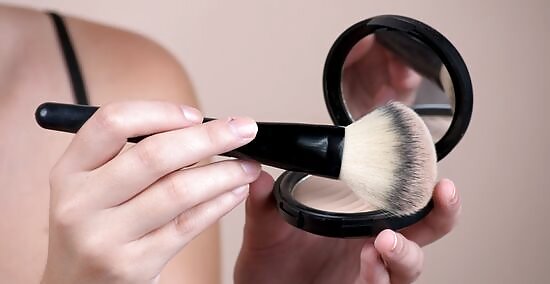
Pick up more foundation as you need it. As you apply the foundation, you’ll probably have to pick up more on your brush every minute or so. You can tell you need more when your skin isn’t getting covered by foundation anymore or you notice streaking as you use your brush. Gently dip your brush into the foundation every time you need it, making sure the entire surface is covered with foundation. The more foundation you use overall, the more coverage you’ll have.
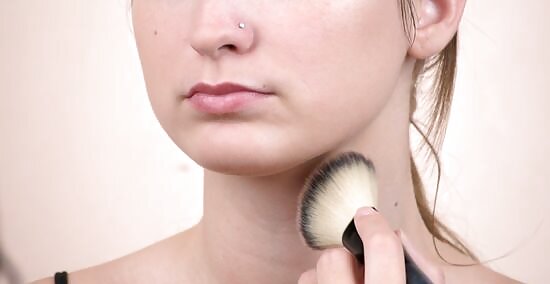
Blend the foundation down your neck. To finish off your foundation, bring the brush down and swipe it from your jawline down to the middle of your neck. Buff the foundation out on your neck in a circular motion to blend it out and make your face look natural with the rest of your skin. Not blending down your neck can leave a stark contrast between your face and the rest of your body, so it’s good practice whenever you’re applying foundation.
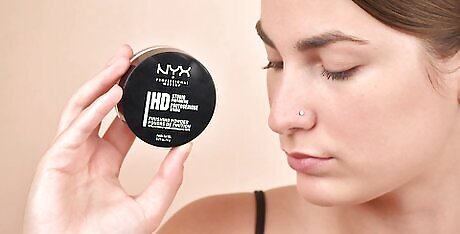
Set the foundation with finishing powder for a longer-lasting stay. Even though you just used a powder for your foundation, you can still use a finishing powder on top of it if you’re planning to wear it for a long time. Finish the rest of your makeup routine (eyes, lips, brows, cheeks) then dip a fluffy brush into some loose finishing powder. Dust it lightly all over your face, focusing on oily areas like your nose, chin, and forehead. Since the powder foundation is pressed into your skin, you can add powder on top of it without worrying about a cakey look.
Avoiding Common Pitfalls
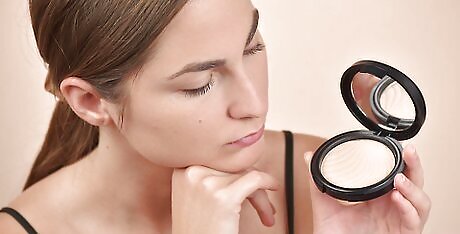
Find the right color for your skin tone. To see if a foundation is a good color match for your skin, dip a q-tip into the foundation and draw a line along your jawline. If the line is invisible, this makeup is a good match. If you can see this line, you'll want to try a different shade. You may have to experiment with several different colors before you find a shade that works.
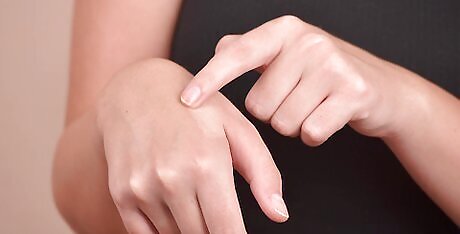
Choose your powder foundation based on the coverage you want. Mineral or light foundation is for light to medium coverage. If you want more coverage, go for pressed powder, which tends to go on darker. You may also choose to apply a layer of mineral foundation and tackle problem areas with pressed powder for a more targeted approach. Try keeping both a mineral foundation and a pressed powder foundation around so you can pick the one that you need based on what you’re doing and how long you’re wearing your makeup.
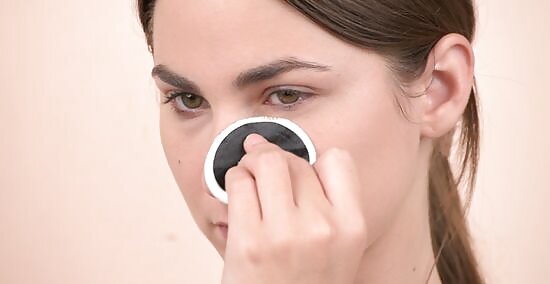
Pat on concentrated foundation to cover any spots or blemishes. If you’ve finished applying your powder foundation and you notice that there’s some patchy areas or blemishes still visible, grab a small concealer brush and dip it into the powder. Press the brush against your skin on the problem areas, then gently pat the foundation into your skin. This will help to add more coverage to cover up any spots that you might have missed. Avoid putting liquid concealer on top of powder foundation, as that can make it smear and remove coverage.
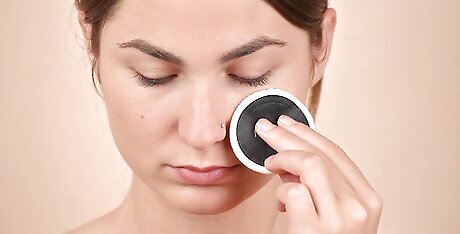
Avoid using your fingers for powder foundation. While liquid foundation is sometimes okay to put on with your hands, powder foundation needs a brush or a sponge to spread out and really dig into your skin. Always put on powder foundation with a dense makeup brush or a sponge for the best coverage. Putting on makeup with your fingers can also introduce germs and bacteria to your skin, so it’s best to use a clean makeup brush.




















Comments
0 comment